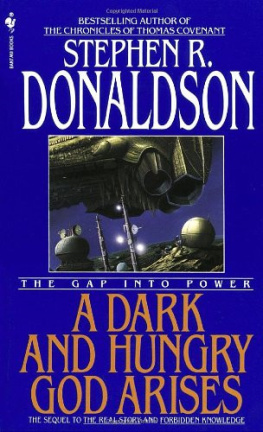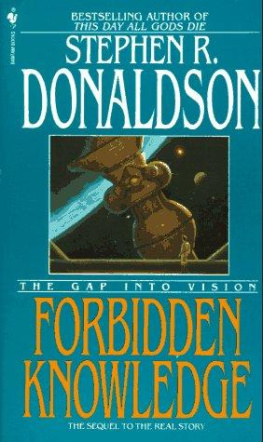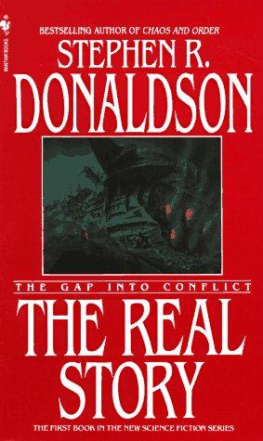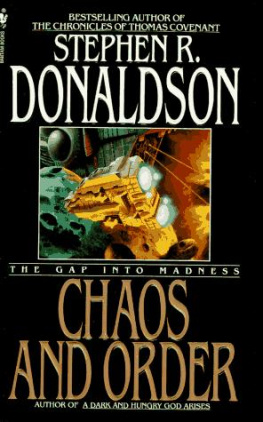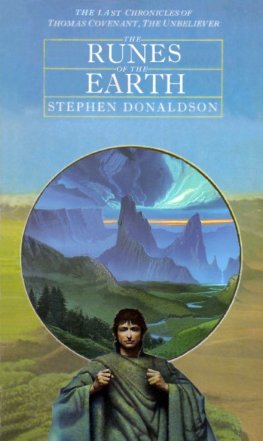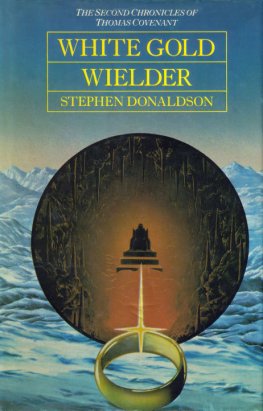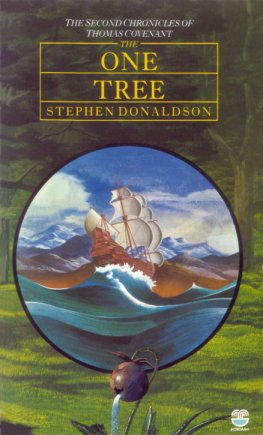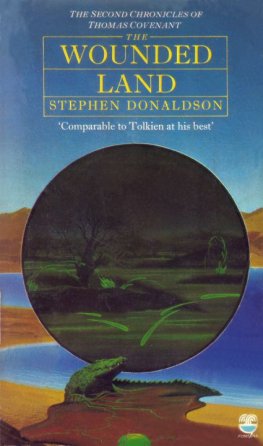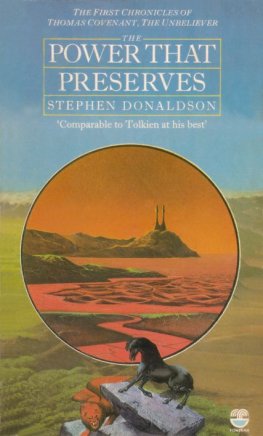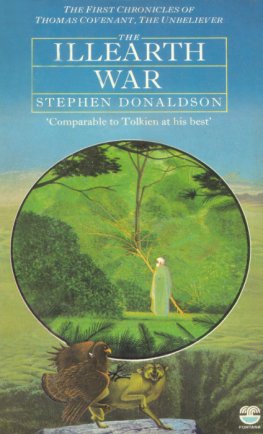Acknowledgments
The help that Ive received while working on The Last Chronicles of Thomas Covenant in general, and on Against All Things Ending in particular, deserves more gratitude than I can properly express. Both John Eccker and Robyn Butler have been invaluable: diligent, generous beyond all expectation, andwhen necessaryrelentless. In addition, their valiant efforts to think well of even my worst prose have a certain fey charm.
For entirely different reasons, I want to thank Christopher Merchant. This book could not have been written without his particular involvement.
And the whole concept of thanks would be meaningless if it did not include Jennifer Dunstan, who lifts me up.
The Burden of Too Much Time
Thomas Covenant knelt on the rich grass of Andelain as though he had fallen there from the distance of eons. He was full of the heavens and time. He had spent uncounted millennia among the essential strictures of creation, participating in every manifestation of the Arch: he had been as inhuman as the stars, and as alone. He had seen everything, known everythingand had labored to preserve it. From the first dawn of the Earth to the ripening of Earthpower in the Landfrom the deepest roots of mountains to the farthest constellationshe had witnessed and understood and served. Across the ages, he had wielded his singular self in defense of Law and life.
But now he could not contain such illimitable vistas. Linden had made him mortal again. His mere flesh and bone refused to hold his power and knowledge, his span of comprehension. With every beat of his forgotten heart, intimations of eternity were expelled. They oozed from his new skin like sweat, and were lost.
Still he held more than he could endure. The burden of too much time was as profound as orogeny: it subjected his ordinary mind to pressures akin to those which caused earthquakes; tectonic shifts. His compelled transubstantiation left him frangible. As the structure of what he had known and understood and thought and desired failed, moment after unaccustomed moment, the sentience that had sustained him across uncounted ages became riddled with fault-lines and potential slippage.
In some fashion which was not yet awareness or true sensation, he recognized that he was surrounded by needs; by people and spectres who had gathered to witness Lindens choices. Dark against the benighted heavens, broad-boughed trees defined the hollow where he knelt among Andelains hills. But their shadows paled in the fervid gleaming of Lorics krill, bright with wild magicand in the ghostly luminescence of the four High Lords whose presence formed the boundaries of Covenants crisis, and of Linden Averys.
Towering and majestic, the Dead Lords stood timeless as sentinels at the points of the compass to observe, and perhaps to judge, the long consequences of their own lives. Berek and Damelon, Loric and Kevin: Covenant knew themor had known themas intimately as they knew themselves. He felt Bereks empathy, Damelons concern, Lorics chagrin, Kevins vehement repudiation. He comprehended their presence. They had been summoned by the same urgency which had brought him to this night, drawn and escorted by the Law-Breakers.
But when he regarded the spirits of the Lordsbriefly, briefly, between one wrenching heartbeat and the nexthe found that he was no longer one of them; one with them. Their thoughts had become as alien and immemorial as the speech of mountains.
Each throb of blood in his veins bereft him of himself.
Caer-Caveral and Elena he comprehended as well. They remained behind him on the slope of the hollow, Caer-Caveral wreathed in the austere self-sacrifice of his centuries as Andelains Forestal, Elena heart-rent and grieving at the cost of the misplaced faith which had led her, unwilling, into the Despisers service. The Law-Breakers might have had the stature of the High Lordsthe grandeur and might of Berek and Damelon, the severe valor of Loric, the anguish of Kevinbut they had been diminished by their chosen deaths; their deliberate participation in the severances which had made possible Covenants return to mortality. Now they had completed their purpose. They stood back, leaving Covenant to lose himself among his flaws.
Had he been able to do so, he might have acknowledged Infelice, not because he esteemed the self-absorbed surquedry of the Elohim, but because he understood the doom which Linden had wrought for them. Of the peoples of the Earth, the Elohim would be the first to suffer extermination. The havoc which would extinguish all of the worlds glories would begin with them.
The Harrow he perceived in glimpses like the flickering of a far signal-fire. But he had already forgotten the warning that those glimpses should have conveyed. His human vision was blurred as if he were weeping, shedding tears of knowledge and power. Terrible futures hinged upon the Insequent, as they did upon Anele: Covenant saw that. Yet their import had dripped into the fissures of his dwindling mind, or had seeped away like blood.
The losses which Linden had forced him to bear surpassed his strength. They could not be endured. And still they grew, depriving him by increments of everything that death and purified wild magic and the Arch of Time had enabled. With every lived moment, fractures spread deeper into his soul.
The Worm of the Worlds End was coming. It was holocaust incarnate. He seemed to feel its hot breath on the nape of the Earths neck.
The Haruchai he knew, and the Ranyhyn, and the Ramen, although their names had fled from him. Of the people who had once been the Bloodguard, and once his friends, he remembered only sorrow. In the name of their ancient pride and humiliation, they had made commitments with no possible outcome except bereavement. Now three of them had been maimed so that their right hands resembled his: the fourth had lost his left eye. Recognizing them, Covenant wanted to cry out against their intransigence. They should have obeyed the summons of their Dead ancestors.
But he did not. Instead he found solace in the company of the Ranyhyn and the Ramenalthough he could not have explained in any mortal language why they comforted him. He knew only that they had never striven to reject the boundaries of themselves. And that the Ranyhyn had warned Linden as clearly as they could.
Like the Ramen, the horses appeared to study the Haruchai warily, as if the halfhand warriors posed a threat which Covenant could not recall.
The Stonedownor he identified more by the orcrest in his hand and the fate on his forehead than by his features or devotion. The young man had chosen his doom when he had first closed his fingers on the Sunstone. He could not alter his path now without ceasing to be who he was.
Everyone who had remained near Linden in this place, this transcendent violation, watched Covenant with shock or consternation or bitterness. However, he was not yet fully present among them. He was only conscious of them dimly, like figures standing at the fringes of a dream. His first frail instants of concrete awareness were focused on Linden.
The anguish on her face, loved and broken, held him. It kept him from losing his way among the cracks of his mind.
She stood defenseless a few paces in front of him. His ring and her Staff had fallen from her stricken fingers. In the silver glare of the krill, the traced stains on her jeans looked as black as accusations. The red flannel of her shirt was snagged and torn as though she had made her way to him through a wilderness of thorns. She seemed empty of resolve or hope, fundamentally beaten, as if he had betrayed her.



